
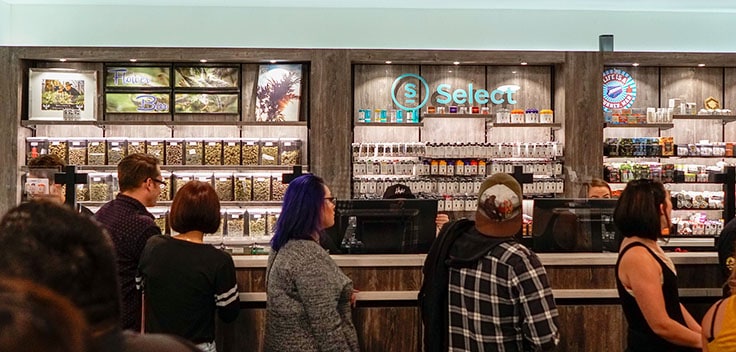
Photo by DJ Davis | hotboxfarms.com
It was 5 a.m. when he heard somebody banging on his window from the darkness outside.
Dan Cummings, the community development director in Ontario, Ore., a city of roughly 11,000 people in the eastern part of the state, had spent some early mornings at his office in the days leading up to that clatter.
Earlier that week, in November 2018, Ontario voters overturned the city’s ban on cannabis sales, with 56.8% of 3,383 balloters showing their support for a local measure that would impose a 3% tax on adult-use retail.
Four years earlier, when Oregonians approved Measure 91 to legalize cannabis cultivation and adult-use statewide during the 2014 general election, residents in Malheur County, where Ontario is located, were on the other side, voting 68.3% against that measure. Under the state law, counties and cities that opposed the measure by at least 60% had the option to outlaw cannabis legalization in their municipalities. The Ontario City Council did just that when its members voted to prohibit cannabis retail in 2015.
But when a citizen-led petition gathered enough signatures to get a new pro-cannabis retail measure added to the Ontario ballot in 2018, Cummings said he started writing community development codes ahead of time in case voters lifted the ban. A couple statutes he wanted to establish included a licensing and permit program for dispensaries as well as 1,000-foot buffer zones between fellow retailers and between a retailer and schools, city parks and residential areas. In addition, potential dispensary owners had to show proof they owned property that met those buffer-zone parameters before receiving city permits.
“We had things in place prior to that so we didn’t get stuck like a lot of cities with your pants down,” Cummings said. “I came in at 4:30 in the morning, which I had been doing a lot to try and get all the codes and everything written up and prepared, and about 5 o’clock I heard somebody bang on the window out front. I looked out there and there was somebody sitting on my bench out there. And, at first, I thought, ‘What are they doing?’ And then it hit me like a rock, ‘Oh, I know what they’re doing. They’re lining up.’ And sure enough, that’s exactly what they were doing.”
While the 2018 measure wouldn’t take effect until Jan. 1, 2019, experienced dispensary owners and aspiring dispensary owners alike started camping outside Cummings’ office the same week of the general election in a mad rush to stake a claim in one of the most promising locations in Oregon. Nestled on the state line with Idaho, Ontario is positioned to take advantage of the most populated area in the Gem State, with Boise residents no farther than 50 miles from town.
Without medical or adult-use legalization in their own state, Idahoans have easy access to Ontario via Interstate 84. In southeastern Oregon and southwestern Idaho, in an area known as Treasure Valley, there are north of 700,000 residents whose major roadways link up in Ontario, and that population is expected to grow.
While state and local law enforcement might have something to say about the matter, the business opportunity was tremendous.
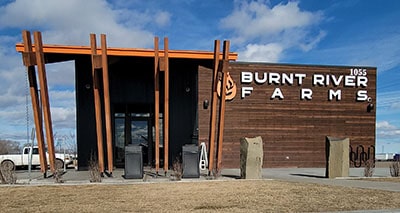
Photo by Danny Ramirez | burntriverfarms.com
Shawn McKay was one of the dispensary entrepreneurs eyeing the opportunity to take advantage of retail space in Ontario after the 2018 ballot measure passed. He and business partner Guss Young, the co-owners of Burnt River Farms, already had a cultivation operation in place in Huntington, Ore., about 30 miles northwest of Ontario. When it came to standing in line outside Cummings’ office to turn in their application for the possibility of opening their first dispensary, there were no guarantees, McKay said.
“It was definitely an unknown,” he said. “I mean, we just had to keep, you know, just sticking to it and looking for a place. And we happened to be fortunate enough to find the place that we did, and we were able to secure it. And we had been through the licensing process a little bit and were familiar with that. So, we just kind of went after it.”
Oregon’s “Highest County”
After push came to shove, three dispensaries opened in 2019 in Ontario, including Weedology in July, Burnt River Farms in August and Hotbox Farms in October. By January 2020, those three retail operations were combining to sell more than $5 million of cannabis products a month, according to data from the Oregon Liquor Control Commission (OLCC).
Five more dispensaries gained traction in 2020, including Top Crop and Zion Cannabis opening their doors in May, Treasure Valley Cannabis Company opening in October, and then The Bud House and Cannabis & Glass setting up shop at the end of the year. Cummings said six more dispensaries are approved for 2021, and there might be around 20 in all before the city is maxed out of space with the requisite buffer zones spread across its 5 square miles.
As cannabis sales in Oregon soared past $1.1 billion in 2020, according to OLCC data, Malheur County concluded 2020 with a whopping $91,713,684 in sales, all coming from the dispensaries in Ontario. The No. 1 county in the state on a per-capital basis, with roughly $3,000 in cannabis sales per resident, Malheur took over the unofficial title of Oregon’s “Highest County,” dethroning three-time defending champion Baker County, which neighbors to the north.
According to Ontario Finance Director Kari Ott, the city is expected to receive approximately $3 million in tax revenue from cannabis sales for fiscal 2020-2021, which ends June 30, to add to its annual general fund budget of almost $10 million.
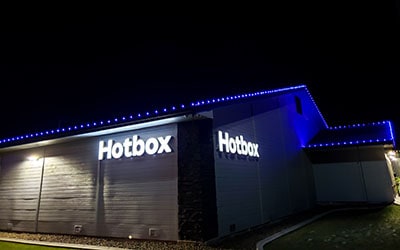
Photo by DJ Davis | hotboxfarms.com
Steven Meland, who co-owns Hotbox Farms with Jeremy Breton, said he hopes to champion the “Highest County” title as a means to attract even more consumers to the dispensary landscape in Ontario.
“There’s certainly a huge opportunity for cannabis tourism,” Meland said. “And I think the Oregon Liquor Control Commission has been fairly supportive of us marketing Ontario as a cannabis tourism destination. It’s somewhere where people can come and enjoy legal access to cannabis. Of course, we certainly don’t recommend that they take it back to their state, or have it leave Oregon at all, but it certainly has been somewhere that sees a very high capita of customers.”
Meanwhile, Multnomah County, which includes Oregon’s most populated city, Portland, remained the state’s leader with $313.4 million in total cannabis sales in 2020, which registers to roughly $385 in sales per person.
While Meland and Breton opened the doors to their Hotbox Farms dispensary in Ontario in 2019, they opened their first dispensary four years earlier in nearby Huntington (in Baker County), a town of about 400 people, where city council members voted in favor of legalizing cannabis sales after state Measure 91 passed. About a 30-minute drive from Ontario, along I-84, Huntington used to be the nearest locality for Idahoans seeking cannabis retail.
But once dispensaries opened in Ontario, it became the closer, go-to destination for travelers from the Treasure Valley region. While Ontario cannabis sales rocketed to $91.7 million in 2020, cannabis retail out of Baker County plummeted from $30.2 million in 2019 to $7.9 million in 2020, roughly a 74% decrease, according to OLCC data. Based on location, Meland said that was to be expected.
“I would certainly say that Huntington was a great place for us to learn the industry and get our feet underneath us,” he said. “When we were able to switch over to running both the Huntington and the Ontario store, we certainly saw an increase in [Ontario] sales right away. There was no drop-off or ramp-up period that was needed for Ontario.”
Overturning the Ontario Ban
Childhood friends, Meland and Breton moved to Ontario in 2015 to start their medical grow, and sold product to dispensaries throughout Oregon. They halted their medical cultivation when the opportunity came to open their Hotbox Farms dispensary in Ontario.
But opening another dispensary wasn’t necessarily the major hurdle they had to clear. Just getting a pro-cannabis initiative on the 2018 ballot was work in itself, Meland said. What started as a grassroots effort to gather signatures for a citizen-led petition turned into organized canvassers and political advisers to run a structured campaign, after Meland and Breton helped fund it.
With Malheur County historically a conservative stronghold—69.4% of its voters cast ballots for Donald Trump in 2020—citizens of Ontario previously voted down pro-cannabis legislation following state-passed Measure 91 in 2014, which left city council members asking what warranted a new measure on the 2018 ballot, Meland said.
“The general sentiment of the town was that they did not want cannabis and that they had already voted to not have cannabis,” he said. “So, there was certainly a large hurdle of even trying to get the conversation. There would have been a much easier path to getting it on the [2018] ballot, which would have simply just had been the city council vote to put it onto the ballot and let the people decide. Once again, however, they weren’t really interested in that, as they felt that people had already spoken.”
But once the 2018 ballot initiative picked up steam, with campaign drives and events attracting petition signatures, city officials created a Marijuana Ad Hoc Committee, to ensure they had their laws and regulations intact. Meland said they asked him to sit on that committee, because of his background and expertise in running cannabis businesses, and then the members of that committee nominated and voted him to be the chairman at their first meeting.
In his responsibility to his community, Meland said he wanted to make sure that he helped create a system that was fair and equitable. While Hotbox Farms did end up getting several dispensary licenses through the award process, it wasn’t the first company to receive those licenses and it wasn’t the first dispensary to open up shop in town.
“A lot of that really was because the system that we created was so fair,” he said. “There was no guarantee who was going to get dispensaries.”
The same day the voters of Ontario bubbled their ballots to overturn the ban on cannabis sales, they also elected a mayor—in a four-candidate race—who ran on a “No Pot” platform. Riley Hill took office with 40.1% of the vote. When the election results came in, those two outcomes created quite the paradox, Meland said.
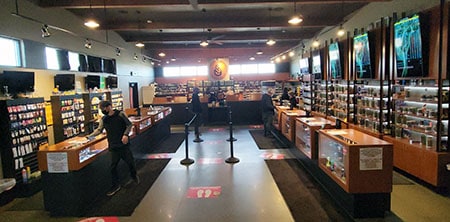
Photo by Danny Ramirez | burntriverfarms.com
The general preconception of Ontario residents might have been that they’d see a bunch of kids standing in line to buy smokable flower outside dispensaries, Meland said. But, if they drove by his Hotbox Farms retail location 30 minutes down the road in Huntington, what they’d actually see were retirees, ex-schoolteachers or business leaders who were there to purchase non-smokable products like topicals, Meland said.
“That started to break down those walls for the community,” he said. “So, even people that maybe were typically a supporter of the new mayor, who’s also somebody who’s been in town a long time, they may have also said, ‘Well, you know, Riley [Hill], we like you. And we like a lot of your policies. But we actually also like this cannabis cream too.’”
The Competitive Market
Once voters gave the greenlight for dispensaries to sell adult-use cannabis in Ontario, it didn’t take long for that line to form outside Cummings’ community development office in anticipation for the application process. After all, to make the process fair, the city adopted a first-come, first-serve system.
But with his door shut and people camping outside at 5 a.m., Cummings heard that bang on his window. In anticipation of a competitive rush to stake a claim in the market—even before the law was in effect—Cummings said he came up with a pre-application stage to maintain order outside his office.
“So, I went out there and painted numbers to keep the people under control out there, because the first thing happened and we had people bullying the other people,” Cummings said. “So, I went out there and painted marks on the sidewalk and separated them and said, ‘You stay in this circle. You don’t harass anybody else or you will lose your spot.’ So, that made them all behave standing in line there.”
In his heyday in the 1960s, Cummings said he was a cowboy who enjoyed his whiskey. Cannabis was never his thing. He moved to Ontario in 1974 and owned an engineering land surveying business up until 2015, when he retired. When city officials got wind of his retirement, they coaxed him into taking on the community development directorship, he said. A few years later, he was at the center of the biggest cannabis retail rush in Oregon.
“Had I only known,” Cummings said and laughed.
Ontario is historically an agricultural community, he said, but it’s always had a big retail hub being on the border with Idaho, which has a 6% sales tax. Oregon’s sales tax is zero.
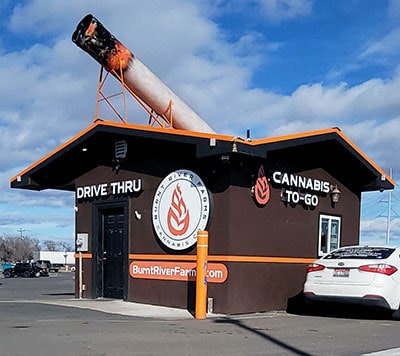
Photo by Danny Ramirez | burntriverfarms.com
But business traffic is more than just Idahoans stopping in town to take advantage of the Ontario retail market, which now includes cannabis. Off I-84, Ontario has two rest areas as well as a Pilot Travel Center and a Love’s Travel Stop. McKay said that brings in even more customers to his Burnt River Farms dispensary.
“We’re right next to the truck stop,” he said. “So, we serve clients from all over the United States on a daily basis. I mean, being next to that border definitely has some influence, but we’re in a really high-traffic area anyway. So, yeah, we want to serve everybody regardless of where they’re from.”
With eight dispensaries now in Ontario, and more coming, owners have to market their businesses in a competitive cannabis landscape. At Burnt River Farms, McKay said he and co-owner Young market their shop as the homegrown company, where they locally produce a lot of the products in their store with a farm-to-table environment. In addition, Burnt River Farms offers the only detached drive-through service in town, McKay said.
“Our customers order online and they show up to the drive-through and pay for their order, and they’re in and out in about two minutes, and it’s pretty much contactless service,” McKay said. “They’re able to stay in their car. They can have their kids in the car. It’s just a great situation for everybody. And we’ve been doing that now since about April of last year.”
Meanwhile, Meland said his Hotbox Farms operation is also vertically integrated, with two grow facilities in Oregon, a processing facility and two wholesale distribution licenses he and co-owner Breton use in Ontario and in Portland to act as a depot for both purchasing and selling to other dispensaries.

Photo by DJ Davis | hotboxfarms.com
In addition to being hometown residents in Ontario, Meland and Breton market their dispensary as the go-to spot for VIP and celebrity appearances. For their grand opening in October 2019, they had Snoop Dogg come out for an impromptu concert that Meland said attracted 10,000-plus people. They only had about a 48-hour window from the time the OLCC told them their license would be issued and actually receiving that license, which meant Meland and Breton didn’t give city officials much of a notice about bringing in Snoop Dogg for a free concert.
“The city was a little flustered,” Meland said. “We sat down with the city manager before it happened, and he certainly expressed his frustrations, as did the city police chief. We kind of let them know that the cat was out of the bag a little bit on this one, and we apologize for the lack of communication, but that the show was going to go on. Again, they were pretty frustrated.”

Photo by DJ Davis | hotboxfarms.com
Ontario Police Chief Steven Romero, who had just joined the city’s department four months earlier, said his early encounters with Meland weren’t as he had hoped.
“[The Snoop Dogg concert] caught me by surprise, but fortunately all went well,” Chief Romero said. “I don’t hold grudges. I don’t believe [Meland] does, either, or hasn’t. But I’ve had very limited contact with him since then.”
Meland said there were no incidents to speak of, like fights or anyone getting hurt, and he and Breton smoothed things over in a follow-up conversation with the city manager, Adam Brown, when they agreed to pay around $10,000 in a settlement to cover the costs of paying overtime for police officers, firefighters and other city officials.
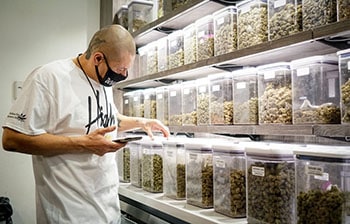
Photo by DJ Davis | hotboxfarms.com
“The city agreed to participate with us next time we want to have an event,” Meland said. “So, that’s the next big thing is that Hotbox isn’t done having events. It’s certainly something that we’ve grown to be known for and grown to love. It’s just a really neat thing for a community of our size to be able to have folks of [Snoop Dogg’s] stature coming to do a show in Ontario”
Hotbox Farms went on to host events with celebrities like Jim Belushi; B-Real of Cypress Hill; and Doggface, the viral TikTok sensation from his longboard skateboarding video with Fleetwood Mac’s song “Dreams.”
Local Law Enforcement
When Oregonians passed Measure 91 in 2014, the state was granted the right to tax adult-use cannabis sales 17%, which, in part, would be dispersed to local municipalities based on population and number of dispensaries. In Ontario, city officials planned to budget much of that money for law enforcement.
But Measure 91 stops short of considering a municipality’s broader customer base—which in this situation would include Idaho and other areas around eastern Oregon—which means that Ontario’s cannabis sales are technically subsidizing the bigger cities in the western part of Oregon. While state taxes amounted to roughly $15.6 million from Ontario’s cannabis sales in 2020, the city only received $65,869 back from the state through the dispersion formula in 2020, according to Ott.
Chief Romero said that money didn’t put much of a dent in the city’s need to grow its police department, which currently has a budget for 24 full-time personnel with four reserve police officers.
Ontario previously funded two officers through its local cannabis tax, so Romero is hopeful his police department will realize some of the anticipated $3 million in city-generated tax revenue for fiscal 2020-21 to expand his agency a bit more, he said. But that revenue stream is still open for discussion among Ontario’s elected officials and the city’s budget committee.
“I’m actually asking for more [full-time officers] now because this department has been underfunded and under structured for quite a long time,” Chief Romero said. “Based on the workload that it produces, and it responds to, it is way understaffed.”
In terms of his department’s relationship with dispensary owners, Chief Romero said his officers take a hands-off approach to being present anywhere around the city’s cannabis retail operations.
“They didn’t want the stigma that if police were visible in their area, that it would hurt their businesses,” he said. “So, I could tell you this —I have not conducted any real proactive outreach to the owners, nor have they in return. It’s not an adversarial relationship, I can guarantee you that. But we really don’t have a lot of communication at all other than when an event happens at their stores.”
In Chief Romero’s previous position, he was a bureau commander for the Hawthorne Police Department on the southwest side of Los Angeles. And he also worked some other assignments, including the deputy directorship at the Los Angeles Interagency Metropolitan Police Apprehension Crime Task Force (IMPACT), one of the largest transnational drug interdiction taskforces in the country.
But when it comes to Ontario law enforcement coordinating with Idaho law enforcement regarding cannabis dispensaries catering to out-of-state customers, Chief Romero said there is none.
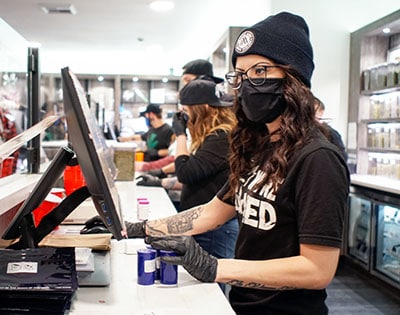
Photo by DJ Davis | hotboxfarms.com
“There’s zero [collaboration with Idaho], because it is a legal activity here, and it’s not our position to, per se, set up marijuana traps,” he said. “Now, Idaho’s law enforcement takes a different stance. They’re still very much firm and it’s still very much illegal in their state. However, for what is considered legal in Oregon, there’s no reason for Oregon law enforcement to collaborate with out-of-state law enforcement.”
Both Chief Romero and Cummings said, if they had to guess, probably 90% of cannabis sales in Ontario come from buyers in Idaho.
Meland said his team at Hotbox Farms treats every customer the same, no matter where they’re from, because it’s legal for them to buy cannabis products at their dispensary in Ontario. What’s illegal is for customers from Idaho to take cannabis back home to their Gem State residences.
“We certainly don’t recommend for any of our customers to press that issue or try their luck with going against the laws of any other state,” Meland said. “But we certainly enjoy living in and operating within Oregon, where we’re able to take part in the industry.”
